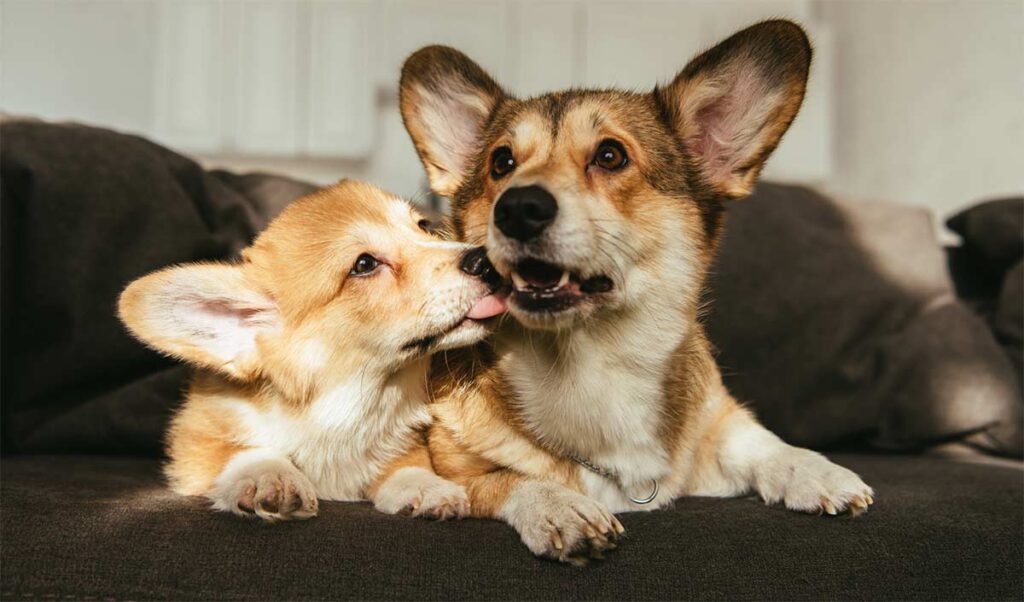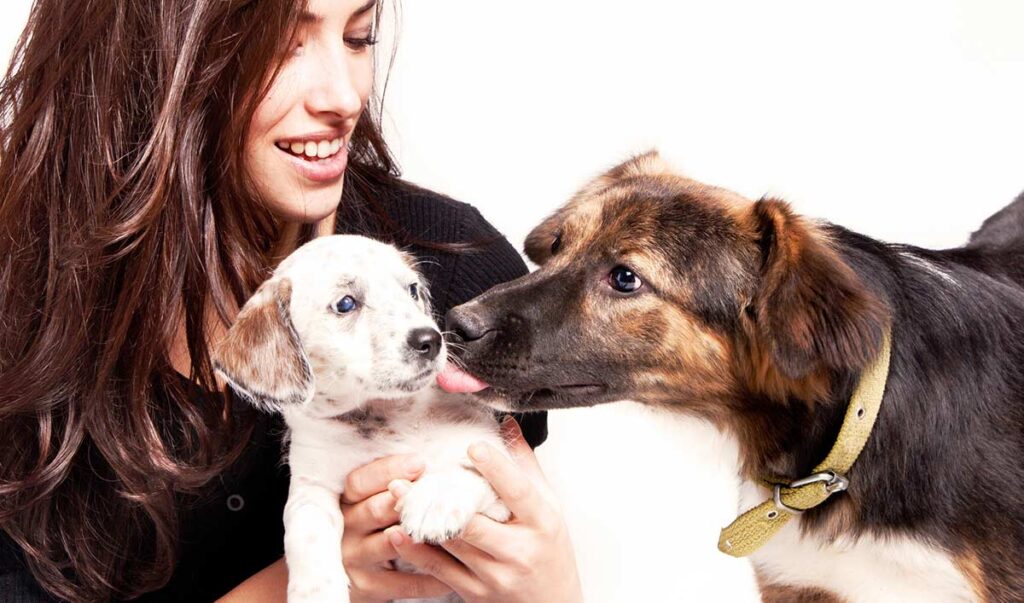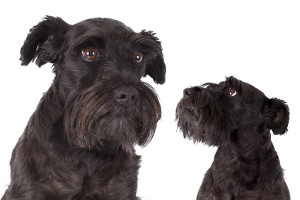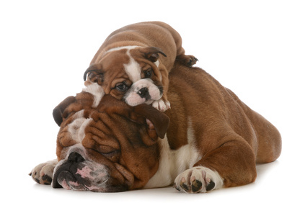This article was updated on January 10th, 2023
Mixing puppies and older dogs can be like creating the perfect PB&J… or it can be more like trying to blend oil and water!
Are you planning on introducing a new puppy, or another adult dog, into a home with a resident senior dog? Set everyone up for success by taking your older dog’s personality, health, and social skills into account.
The first few days, or weeks, could be a bit ‘rocky’ or at the very least, interesting. But most dogs will accept a newcomer into their pack given enough time and space.
If this is the first time you’ve tried to bring a younger pup or dog into a home with your senior dog, you might be wondering what to expect and when you should be concerned or intervene. The interaction between a newcomer and a resident is a little different because every dog/puppy is unique.
Puppies And Older Dogs – Early Days
Before I talk about what to expect when you first bring your new pup home, let’s take a quick look at the things you can do to help this budding relationship turn into a friendship:
Give yourself the best possible chance of becoming one bigger, happier family, by doing the following three things:
- Choose a puppy of the opposite sex to your older dog
- Pick a personality type that meshes with your resident dog’s temperament
- Make sure you have the understanding, and patience, to help them both adjust
Before you bring your new puppy home, consider:
- How should you handle introductions?
- What will the first days/weeks be like?
- When should you step in or let them sort it out by themselves?
- How will you know if there’s a real problem?
- What will you do if there IS a real problem?
Let’s take a look:
Introducing A Puppy To Your Older Dog
How you handle the introductions between puppies and older dogs largely depends on your resident senior’s personality.
Does he generally like and tolerate other dogs or pets?
If the answer is yes, then the chances are good that he won’t take an instant dislike to the new kid on the block. This can change once he realizes the new kid is here to stay!
Even if you’re sure that your older dog won’t hate your puppy at first, introduce them slowly and have another person on hand to ensure things run smoothly.
- Most dogs will want to sniff the new arrival thoroughly and will stick to him like glue wherever he goes.
- Expect some excitement, maybe a little rough play, and even some growling (usually on your senior dog’s part).
- Puppies and older dogs have entirely different social skills and playing styles, and it takes time for them to understand and accept each other’s quirks.
- Luckily, most dogs recognize a puppy and make allowances for the inexperience of youth!
Senior dogs tolerate more and are usually gentle in their reprimands. Unfortunately, puppies don’t have this sixth sense to guide them and tend to hound the older dog and cross all social boundaries without thinking.
Older dogs may be wise and tolerant, but they’re not saints… and puppies who step too far over the line, or do it too often, will be corrected.
If the first gentle correction doesn’t work, growling, nipping or even physical dominance will be used. Avoid correcting your older dog for lifting their lip or growling because they’ll move right to the snap. Instead, move your puppy away and give your older dog some space.
Try to let the two of them sort things out for themselves as much as possible, but don’t leave them alone without supervision for at least the first couple of weeks to be safe.
Step in only if you’re truly worried that one of them is going to get hurt (and it’s not always the puppy who’s most at risk). Here’s what to do if that happens:
- Correct them both
- Separate them for a while
- Redirect each dog’s attention with calm one-on-one play or cuddles
Is he just a little unsociable?
If your older dog isn’t keen on interacting with other dogs, you’ll have your work cut out for you to persuade him that the new puppy is a good idea.
An older dog may surprise you with his acceptance, tolerance, and love for the new arrival, but avoid setting up expectations. Instead, be prepared to work at it!
All initial introductions should be on neutral ground to avoid territorial behavior. A quiet corner of a nearby park or just down the street from your house is a good choice. Take your new pup to a park only if its fully vaccinated to avoid disease. Choose a spot that your senior dog is already familiar with and feels comfortable. Doing so keeps the meeting low-key.
Here are the steps we recommend:
- Have someone hold the pup while you stay with your senior.
- Let any sniffing and investigation come naturally, be patient.
- If the pup gets too pushy or your dog becomes defensive, step back and regroup.
- Talk quietly and reassuringly to your older dog and encourage him to be gentle.
- Use treats to reward calm behavior.
You can head home together once these initial introductions are complete, but plan on at least thirty minutes or more for the best results.
Walk both your dog and the puppy into your house simultaneously, with your resident dog going first, which helps to prevent territorial behavior.
Allow them to interact as naturally as possible, but supervise them at all times. If things get rough, one of them gets upset, or they get too snippy with each other, reprimand them gently but firmly, and give them both some alone time.
Offer your older dog plenty of quiet time away from your new addition, or he could feel overwhelmed and anxious.
Don’t leave puppies and older dogs alone together for several weeks. You need to be absolutely sure they’re friends before taking that chance.
The ‘alpha’ senior
Does your older like to:
- Be in charge of whoever is around – whether he knows them or not?
- Avoid sharing his toys?
- Guard his people or possessions?
- Avoid playing with others?
- Growl, nip or stand erect other dogs who invade his space?
If your older dog has this type of personality, think twice about adding a new puppy. A very dominant dog who doesn’t want another dog in his space could seriously injure a puppy and put both dogs and people on edge.
Puppies are very impressionable, and they pick up their social cues from your other dog. If your puppy’s first role model is anti-social, dominant, and bad-tempered, growing up to be a happy, confident, and friendly dog will be challenging and may not have a happy ending.
If you’re adamant about getting a new puppy, keep the social dynamics as stable as possible. Avoid forced interactions and accept that your senior dog is the dominant one by:
- Giving him his food bowl first
- Letting him be the first one out the door
- Provide him with more attention than the puppy
By doing these things, you lessen the chances of an aggressive encounter taking place.
What is his health like?
Puppies and older dogs can get along rather well; however, take care if your older dog has:
- Mobility or strength problems
- Chronic pain
- Hearing or sight loss
- Old dog syndrome
Adding a puppy to your home may be too much for your older friend to handle. Senior dogs also tend to rely very heavily on their established routines for security and can become anxious as they age. The stress of adding a new puppy may increase your older dog’s anxiety levels.
If any of these apply to your senior, then this old dog who has spent his life loving you probably deserves to spend his final years enjoying the peace of a single-dog home.
You could investigate adding another older dog, maybe even a senior…. there are SO many of them condemned to spending whatever time they have left in a shelter or pound.
But again, a lot would depend on the personality of both dogs. Take time and give it some thought because you want to improve the life of both dogs, not make it more stressful.
Reducing your older dog’s quality of life probably isn’t what you’re aiming for, but it could happen in this type of situation.
Beyond The Introductions
The first week or two are usually the most challenging.
By the end of that time, most puppies and older dogs will have accepted the presence of the other one and be on the way to working out a relationship.
Not ALL dogs will adjust this quickly; some dogs can take weeks. Others will enjoy each other’s company from day one.
Dogs’ personalities determine how things go, and unfortunately, there’s no way to tell ahead of time.
In addition to the tips above, here are other things that you can do to help them get along.
Pay Special Attention To Your Senior Dog
Focus on reassuring your older dog that he is still number one in your heart, and always pet, feed, and play with him first. Dogs need to have a stable environment to feel secure and happy.
Your older dog and other family members are the elders, while the puppy is the newcomer. Your new puppy is at the bottom of the heap in the dog world.
Avoid inviting jealousy or destabilizing your household by fussing over your new puppy and ignoring your senior dog.
Puppies are undeniably adorable, and it’s easy to spend too much time crooning over the newest little furball but resist the temptation.
‘Management’ Tips
- Prevent Squabbles: Avoid arguments over toys and other resources by ensuring there are plenty to share. Don’t just give Fido Jr. the shiny new toys either, make sure your senior dog has his own new, and special, toys. Don’t let the pup ‘steal’ any either!
- Have Special Time With Each One: Make sure each dog has dedicated one-on-one time with you, and other family members. If your senior dog has a close bond with you or another family member, have the rest of the family interact more with the puppy so that your older doesn’t lose his BFF. Doing so avoids jealousy, especially on your older dog’s part.
- Find Outlets For Puppy Energy: There’s a lot of truth in the old saying ‘A tired puppy is a good puppy’, so do make sure that Fido Jr. gets plenty of exercise. Ten to fifteen minutes several times a day is a good guideline. Lack of exercise for your puppy can strain your old dog’s nerves because your puppy will have excess pent-up energy. But don’t play a hectic game of ‘fetch’ in the backyard which your old dog can’t join in but is left to watch from inside. Be creative, and empathetic in finding ways to exercise Jr. without upsetting Sr. Having your older dog outside and having family members play with both separately works well.
- Watch For Changes As Puppy Grows: Although most older dogs will tolerate puppies, even when they misbehave, at some point their ‘get out of jail free’ card expires. This usually happens when the pup becomes an adolescent (imagine the friction between a teenager and parent/guardian). Be ready to correct any misbehavior or over-reactions (by pup or senior) and act as referee for a while.
- Take Your Older Dog’s Health Into Account: All dogs are different, and some seniors are tough and others are frail. Not every senior dog is healthy enough for a new puppy playmate.
What’s Normal and When Should I Worry?
If the doggie status-quo hasn’t changed much in your home for a while, you might be wondering what to expect when puppies and older dogs get together.
Or maybe your senior dog is your first dog, and you’ve never tried to ‘blend’ a canine family before.
Either way, there are bound to be times when you wonder, “Is this behavior normal?”
So, here are some of the things you’re likely to see, and a rough guide as to whether they’re normal, or something you need to get help with.
Your new puppy ‘harasses’ your older dog
A puppy harassing a senior dog is normal behavior. Your puppy is used to the rough-and-tumble of play with his littermates and hasn’t discovered that your senior dog is not a puppy. It may be unpleasant for you and your older dog, however.
It’s common for your new puppy to pounce on your older dog’s head, tail, or body and paw at his face or bite his tail.
Most good-natured adult dogs take a certain amount of puppy silliness before putting their paw down. However, your older dog’s personality may be a factor in how much he’ll tolerate.
You usually don’t need to interfere too much here unless the puppy is getting too rough and he’s hurting your older dog.
But this behavior is just one of the reasons why you don’t want to add a new puppy to a home with an old dog who’s frail or in poor health.
Puppies are NOT known for being gentle.
Your new puppy steals the older dog’s toys
Again, this is pretty normal when puppies and older dogs get together. Puppies don’t have boundaries for their behavior and they have an endless supply of energy.
But just because it’s normal that doesn’t mean you should allow it to happen.
You need to protect both Fido Jr. and Fido Sr., so if the little guy keeps taking the older dog’s toys, tell him ‘no’, take them from him and give them back.
Then redirect the pup’s attention to something he IS allowed to play with.
Your older dog growls, or snaps at the puppy
Your puppy’s mom corrected his behavior, but she’s not here anymore.
Puppies and older dogs can get along reasonably well often, and your senior dog will tolerate some puppy antics.
Chewing your older dog’s ears once too often, stealing his bone for the tenth time, or waking him from a nice nap by jumping on his belly, will cause trouble.
Most older dogs will curl their lip and give the pup a hard stare as a first warning. If this first correction doesn’t work, your older dog may growl and eventually move to snapping and biting. These are teaching moments for your puppy, so please don’t panic!
Most puppies get the message quickly, and this type of correction is universally understood in the dog world. Your pup will know he went too far and will most likely yelp, run away, or turn over to show his tummy in submission.
If your older dog bites the pup and draws blood or hurts him, that’s a no-no. But this is rare with friendly, stable dogs.
Your older dog chases, bites or hurts your puppy
This is NOT normal, with one caveat… during the first day or so, older dogs may sniff the pup a lot, and follow him around.
When your older dog follows your new puppy, it’s because he’s curious but cautious. He’ll want to know what this strange little pup is up to and what he smells like!
An adult dog who stalks the puppy with a tight body position and his ears back, and possibly growling or stomping on the pup, isn’t feeling curious or cautious. He’s not happy.
You need to watch this behavior carefully and don’t leave the two of them alone for a minute.
If your older dog rushes at the pup, bites him, shakes him, or generally treats him too roughly (and not in a playing kind of way), you need to reprimand him and separate them.
When this happens, interaction should be a little less hands-on, perhaps put the pup in a playpen, or use a baby-gate to keep him in the laundry room or mud room, out of harms way.
But still allow the older dog to see and sniff him through the mesh or bars….
…. this way they’ll get used to each other from a safe distance to begin with.
If, after a few days, you reintroduce them face to face and Fido Sr. still acts as though he thoroughly dislikes this pup, you may need to rethink the situation.
Disclaimer: This website's content is not a substitute for veterinary care. Always consult with your veterinarian for healthcare decisions. Read More.








Thank you for the article. I have a general question. Is it usually a benefit to the senior dog to have a new puppy in the house once they get past the first coupled of months? I’m worried my slightly anti-social mini poodle will adjust but will be less happy with a newcomer. I’m hoping someone can tell me that usually, all dogs prefer the addition of another dog.
Thank you.
Good advice. However one of my 2 puppies (Jack russell) keeps putting her muzzle over the muzzle of my 14 year old border terrier. Obviously old dog does not like it and shows her teath and grawls. What do you think this means?
Hi, I have a 2yr old Olde English Bulldog (Georgia) and her 3month old puppy (Ace). Majority of the time Ga & Ace get along well, especially if they are by themselves playing. But when me or my siblings come around Ga chases and bites Ace, who then yelps & runs to hide. How can I stop Ga from doing this? I don’t want to have to put Ace in the crate every time someone comes around because of the way Ga acts.